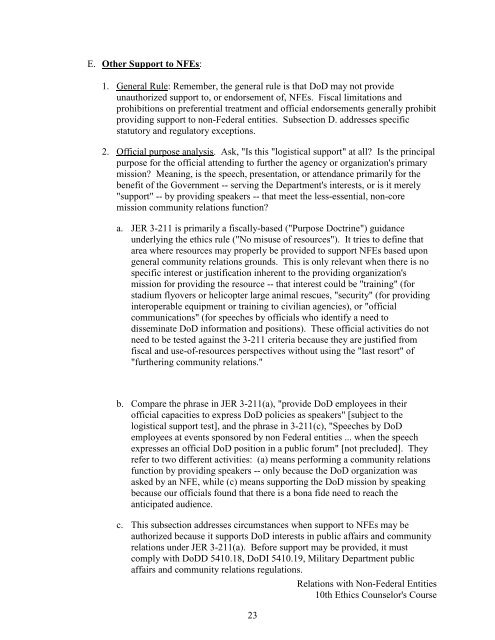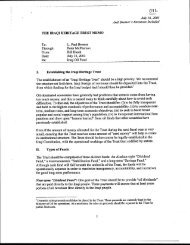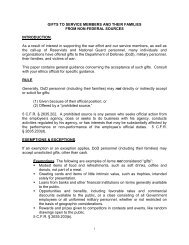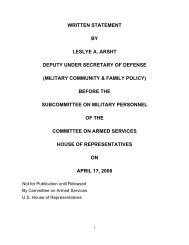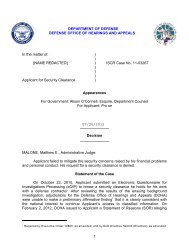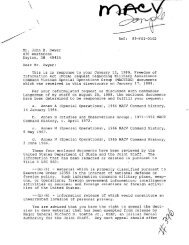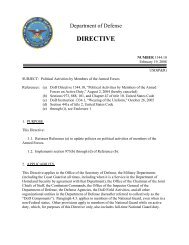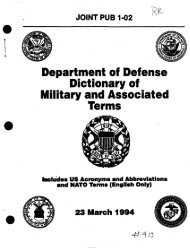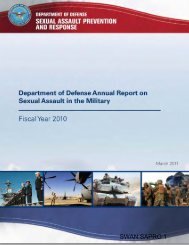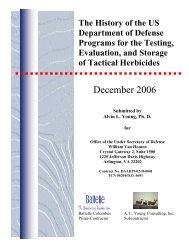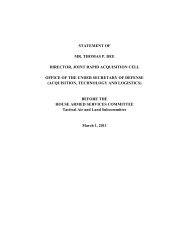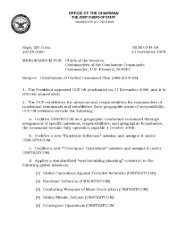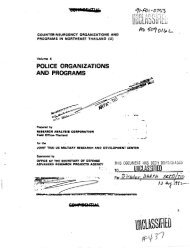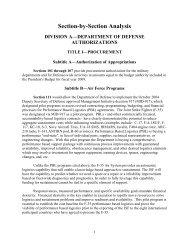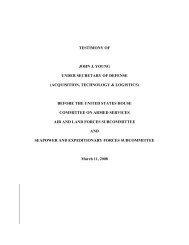relations with non-federal entities - United States Department of ...
relations with non-federal entities - United States Department of ...
relations with non-federal entities - United States Department of ...
- No tags were found...
Create successful ePaper yourself
Turn your PDF publications into a flip-book with our unique Google optimized e-Paper software.
E. Other Support to NFEs:1. General Rule: Remember, the general rule is that DoD may not provideunauthorized support to, or endorsement <strong>of</strong>, NFEs. Fiscal limitations andprohibitions on preferential treatment and <strong>of</strong>ficial endorsements generally prohibitproviding support to <strong>non</strong>-Federal <strong>entities</strong>. Subsection D. addresses specificstatutory and regulatory exceptions.2. Official purpose analysis. Ask, "Is this "logistical support" at all? Is the principalpurpose for the <strong>of</strong>ficial attending to further the agency or organization's primarymission? Meaning, is the speech, presentation, or attendance primarily for thebenefit <strong>of</strong> the Government -- serving the <strong>Department</strong>'s interests, or is it merely"support" -- by providing speakers -- that meet the less-essential, <strong>non</strong>-coremission community <strong>relations</strong> function?a. JER 3-211 is primarily a fiscally-based ("Purpose Doctrine") guidanceunderlying the ethics rule ("No misuse <strong>of</strong> resources"). It tries to define thatarea where resources may properly be provided to support NFEs based upongeneral community <strong>relations</strong> grounds. This is only relevant when there is nospecific interest or justification inherent to the providing organization'smission for providing the resource -- that interest could be "training" (forstadium flyovers or helicopter large animal rescues, "security" (for providinginteroperable equipment or training to civilian agencies), or "<strong>of</strong>ficialcommunications" (for speeches by <strong>of</strong>ficials who identify a need todisseminate DoD information and positions). These <strong>of</strong>ficial activities do notneed to be tested against the 3-211 criteria because they are justified fromfiscal and use-<strong>of</strong>-resources perspectives <strong>with</strong>out using the "last resort" <strong>of</strong>"furthering community <strong>relations</strong>."b. Compare the phrase in JER 3-211(a), "provide DoD employees in their<strong>of</strong>ficial capacities to express DoD policies as speakers" [subject to thelogistical support test], and the phrase in 3-211(c), "Speeches by DoDemployees at events sponsored by <strong>non</strong> Federal <strong>entities</strong> ... when the speechexpresses an <strong>of</strong>ficial DoD position in a public forum" [not precluded]. Theyrefer to two different activities: (a) means performing a community <strong>relations</strong>function by providing speakers -- only because the DoD organization wasasked by an NFE, while (c) means supporting the DoD mission by speakingbecause our <strong>of</strong>ficials found that there is a bona fide need to reach theanticipated audience.c. This subsection addresses circumstances when support to NFEs may beauthorized because it supports DoD interests in public affairs and community<strong>relations</strong> under JER 3-211(a). Before support may be provided, it mustcomply <strong>with</strong> DoDD 5410.18, DoDI 5410.19, Military <strong>Department</strong> publicaffairs and community <strong>relations</strong> regulations.23Relations <strong>with</strong> Non-Federal Entities10th Ethics Counselor's Course


